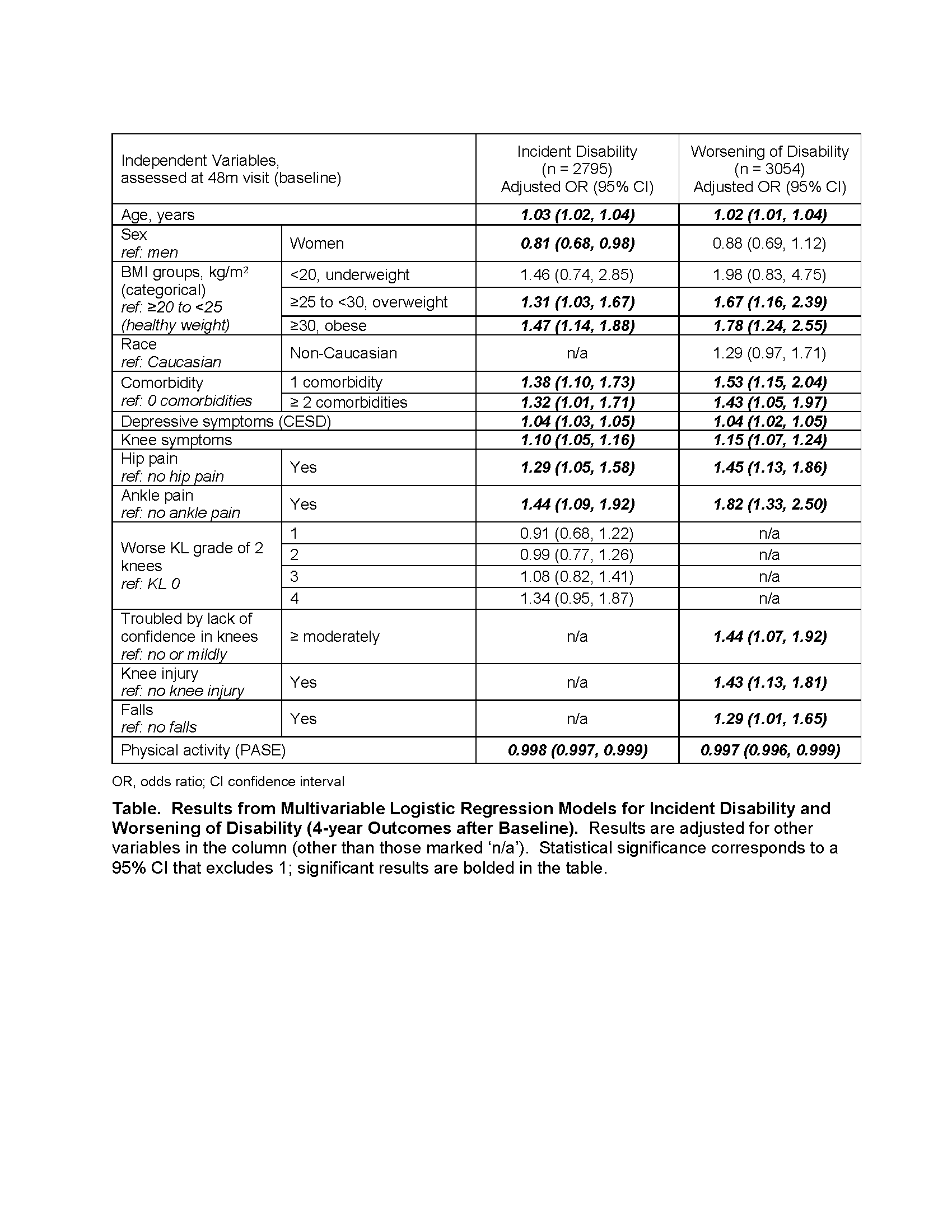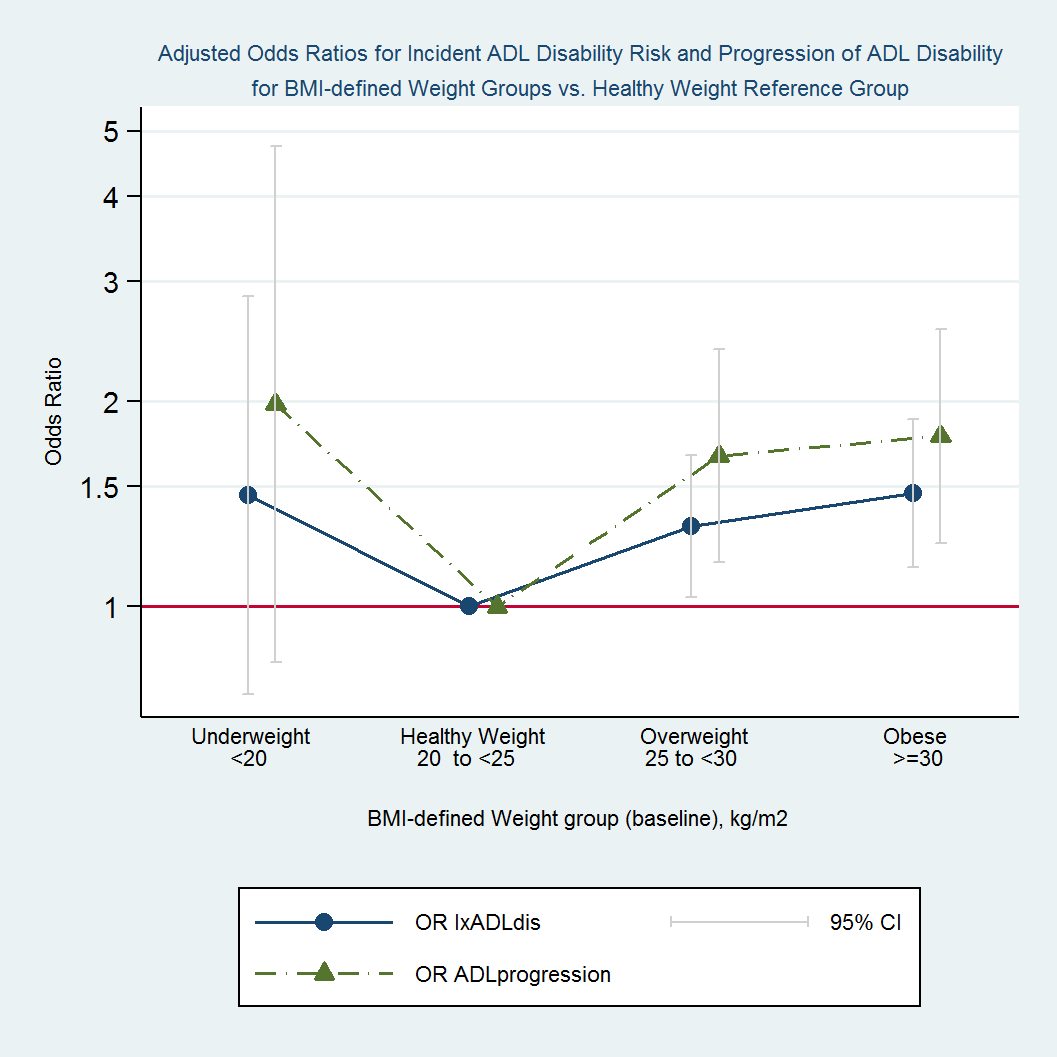Session Information
Date: Tuesday, November 7, 2017
Title: Osteoarthritis – Clinical Aspects Poster II: Observational and Epidemiological Studies
Session Type: ACR Poster Session C
Session Time: 9:00AM-11:00AM
Background/Purpose: US studies have revealed a U-shaped relationship between BMI and poor outcomes (function, mortality); both underweight and overweight/obese persons have greater risk. In knee OA, effects of overweight/obesity have been studied, but the impact of being underweight is unknown. We hypothesized that, in persons with or at higher risk for knee OA, underweight persons are at higher risk for incident and worsening disability.
Methods: A cohort study of persons 45-79 yrs with or at higher risk of knee OA, the OAI began ADL/IADL collection at 48m (analysis baseline). 48m BMI was stratified as underweight (<20 kg/m2), healthy weight (≥20 to <25), overweight (≥25 to <30), or obese (≥30), and disability levels were: none (no ADL/IADL limitation), mild (only IADL), moderate (1-2 basic ADL), or severe (≥3 basic ADL). Incident disability was defined as 96m IADL or basic ADL disability in persons without 48m disability, and worsening disability as 48m-96m level worsening. Logistic regression was used to assess associations between BMI group (vs. healthy weight) and outcomes. Multivariable models included BMI and variables with univariate p≤0.20; backward selection (removing variables with adjusted p>0.20) was used for final models.
Results: Of 2795 persons eligible (57% female, mean age 64.7, BMI 28.5), 754 (27%) developed incident disability. Of 3054 persons (57% female, age 64.8, BMI 28.6), 360 (12%) had worsening disability. Each BMI group had increased odds for both outcomes, not statistically significant for underweight, vs. healthy (Table, Fig). In final models, age, comorbidity, depressive symptoms, knee symptoms, hip pain, ankle pain, and physical activity were associated with both outcomes; sex, with incident disability only; and injury, confidence, and falls with worsening disability only.
Conclusion: In persons with or at increased risk for knee OA, being underweight may result in an increased risk for incident and worsening disability. The lack of significance may be due to the small number (60) of underweight persons in the OAI, which was enriched for higher BMI. These findings suggest the importance of targeting a healthy BMI range and identify a subgroup who may be at risk for poor outcome.
To cite this abstract in AMA style:
Ghosh N, Chmiel JS, Almagor O, Hayes KW, Moisio KC, Chang AH, Szymaszek J, Sharma L. Risk of Disability in Underweight Persons with or at Increased Risk of Knee Osteoarthritis [abstract]. Arthritis Rheumatol. 2017; 69 (suppl 10). https://acrabstracts.org/abstract/risk-of-disability-in-underweight-persons-with-or-at-increased-risk-of-knee-osteoarthritis/. Accessed .« Back to 2017 ACR/ARHP Annual Meeting
ACR Meeting Abstracts - https://acrabstracts.org/abstract/risk-of-disability-in-underweight-persons-with-or-at-increased-risk-of-knee-osteoarthritis/


